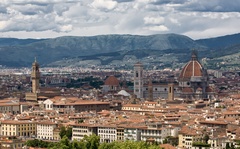Yesterday, EU Universe Awareness (EU-UNAWE) organised a well attended session about emerging models for engaging children in science at the Public Communication of Science and Technology (PCST) 2012 conference, which is currently being held in Florence, Italy.
PCST is the biggest international conference for science communicators, providing an excellent platform to publicise the many new initiatives that organisations and institutes are developing to inspire children to develop an interest in science. This is one of first times that a session dedicated to science communication for children has been held at a PCST conference in its 12-year history.
Pedro Russo, International Project Manager for EU-UNAWE, gave a summary of his organisation’s many activities and how communicating astronomy is an opportunity to promote global citizenship to young children. Representatives from the Astrophysical Observatory of Arcetri picked up on the latter theme, by discussing the cultural roots of astronomy in countries around the world. They also highlighted the importance of developing non-verbal educational resources to overcome language barriers, such as producing shadow puppet shows.
Away from the confines of astronomy, representatives from the Science Museum and the Natural History Museum (NHM), both based in London in the UK, presented the new initiatives that their institutes have developed. Toby Parkin, Outreach and Schools Programme Coordinator at the Science Museum, discussed a number of formats, including how a travelling theatre show called Science Museum Live on Tour! is making science accessible to a greater audience. Stephen Roberts from the NHM shared his experience of using social media and videoconferencing to engage children in remote biodiversity fieldwork. “It can take pupils to places that they may never travel, and introduce them to people they may otherwise never meet,” he said.
Concluding panel discussions covered the need to develop educational resources for teachers and parents in different formats, such as supplementing online resources with hard copies. Other topics discussed included business models and how science outreach events at unusual venues, such as music festivals, can help to reach disengaged audiences. The discussion concluded with the biggest challenges in science outreach for children, with Toby commenting on the need to compete against media entertainment, such as video games and television, to grab the attention of children.
Most of the presentations are now available on UNAWE’s SlideShare site.













